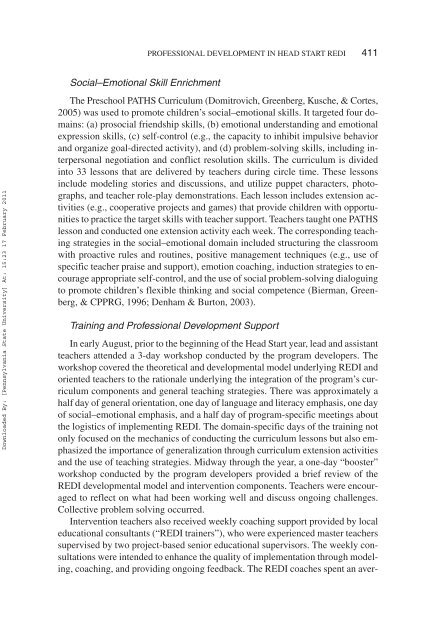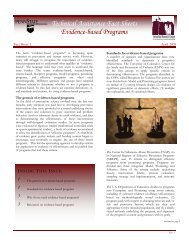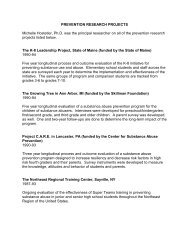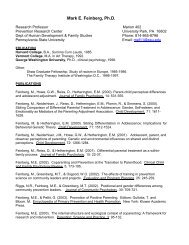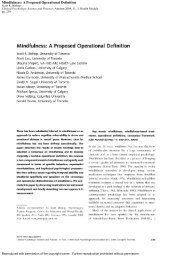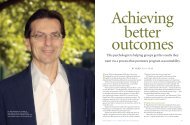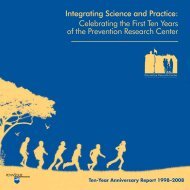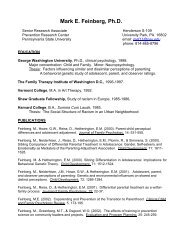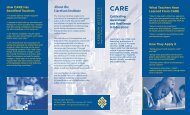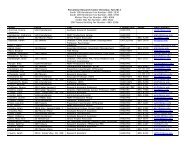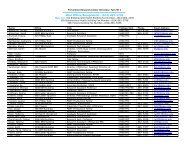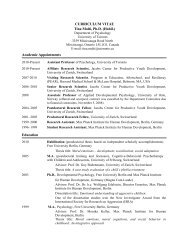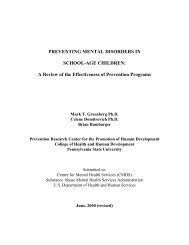Early Education & Development Individual Factors Associated With ...
Early Education & Development Individual Factors Associated With ...
Early Education & Development Individual Factors Associated With ...
You also want an ePaper? Increase the reach of your titles
YUMPU automatically turns print PDFs into web optimized ePapers that Google loves.
PROFESSIONAL DEVELOPMENT IN HEAD START REDI 411<br />
Downloaded By: [Pennsylvania State University] At: 15:23 17 February 2011<br />
Social–Emotional Skill Enrichment<br />
The Preschool PATHS Curriculum (Domitrovich, Greenberg, Kusche, & Cortes,<br />
2005) was used to promote children’s social–emotional skills. It targeted four domains:<br />
(a) prosocial friendship skills, (b) emotional understanding and emotional<br />
expression skills, (c) self-control (e.g., the capacity to inhibit impulsive behavior<br />
and organize goal-directed activity), and (d) problem-solving skills, including interpersonal<br />
negotiation and conflict resolution skills. The curriculum is divided<br />
into 33 lessons that are delivered by teachers during circle time. These lessons<br />
include modeling stories and discussions, and utilize puppet characters, photographs,<br />
and teacher role-play demonstrations. Each lesson includes extension activities<br />
(e.g., cooperative projects and games) that provide children with opportunities<br />
to practice the target skills with teacher support. Teachers taught one PATHS<br />
lesson and conducted one extension activity each week. The corresponding teaching<br />
strategies in the social–emotional domain included structuring the classroom<br />
with proactive rules and routines, positive management techniques (e.g., use of<br />
specific teacher praise and support), emotion coaching, induction strategies to encourage<br />
appropriate self-control, and the use of social problem-solving dialoguing<br />
to promote children’s flexible thinking and social competence (Bierman, Greenberg,<br />
& CPPRG, 1996; Denham & Burton, 2003).<br />
Training and Professional <strong>Development</strong> Support<br />
In early August, prior to the beginning of the Head Start year, lead and assistant<br />
teachers attended a 3-day workshop conducted by the program developers. The<br />
workshop covered the theoretical and developmental model underlying REDI and<br />
oriented teachers to the rationale underlying the integration of the program’s curriculum<br />
components and general teaching strategies. There was approximately a<br />
half day of general orientation, one day of language and literacy emphasis, one day<br />
of social–emotional emphasis, and a half day of program-specific meetings about<br />
the logistics of implementing REDI. The domain-specific days of the training not<br />
only focused on the mechanics of conducting the curriculum lessons but also emphasized<br />
the importance of generalization through curriculum extension activities<br />
and the use of teaching strategies. Midway through the year, a one-day “booster”<br />
workshop conducted by the program developers provided a brief review of the<br />
REDI developmental model and intervention components. Teachers were encouraged<br />
to reflect on what had been working well and discuss ongoing challenges.<br />
Collective problem solving occurred.<br />
Intervention teachers also received weekly coaching support provided by local<br />
educational consultants (“REDI trainers”), who were experienced master teachers<br />
supervised by two project-based senior educational supervisors. The weekly consultations<br />
were intended to enhance the quality of implementation through modeling,<br />
coaching, and providing ongoing feedback. The REDI coaches spent an aver-


